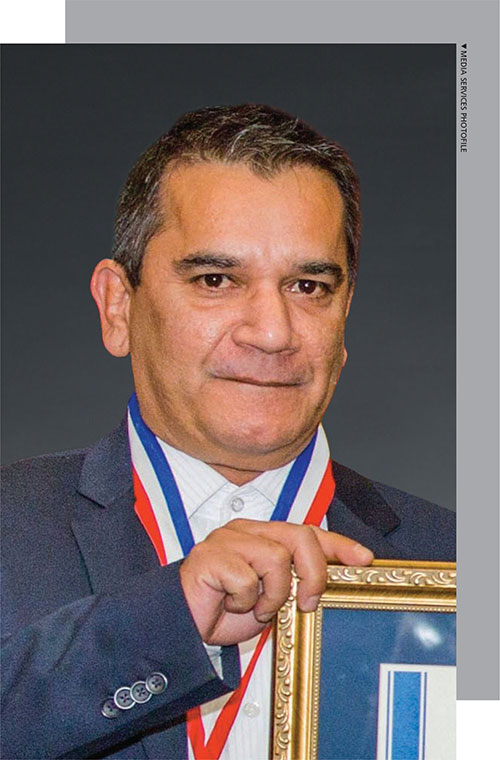Dirk Tissera
Factual and unbiased reporting

Q: Could you tell us about your journey as a journalist, beginning with your early days in Sri Lanka, and then the Middle East and Canada?
A: I started my career in journalism at the Daily Mirror-Sunday Times in 1981 at the Times of Ceylon building in the Colombo Fort. First, I was assigned to the sports desk, and later moved on to cover the crime, parliament, cabinet briefings and political beats.
In 1984, the Daily Mirror-Sunday Times closed down, and I joined Independent Newspapers’ Sun and Weekend as part of the sports team.
Q: So what inspired you to pursue a career in journalism?
A: While in school, I had a passion for writing and wanted to pursue journalism. My English teacher and late father Stanley Ivor Tissera gave me the push. They felt I had the flair to become a journalist and their encouragement helped boost my confidence.
Q: Could you share any memorable stories or experiences from your time as a reporter in Sri Lanka during the 1980s?
A: Shortly after the July 1983 riots, I undertook a journey with a close friend to transport around a hundred displaced Tamils (men, women and children) who had lost everything. We took them from their location at Colombo Hindu College in Ratmalana to Trincomalee. These people’s houses and belongings had been burnt to the ground – and they had nothing.
We managed to get them to safety in Trincomalee and drove back to Colombo, beating the curfew by a few minutes. I will never forget that harrowing experience as our vehicle was stopped many times on the way by angry mobs.
In 1985, I had the privilege of reporting on Sri Lanka’s historic first Test victory over India at the Colombo Oval (P. Saravanamuttu Stadium). Duleep Mendis led Sri Lanka while Kapil Dev was India’s captain.
I worked for the Sun-Weekend group at the time and recall the jubilation in the press box when Rumesh Ratnayake held on to a blinding return catch off his own bowling to dismiss Kapil and give Sri Lanka its first Test win.
Some of India’s veteran journalists – Rajan Bala, R. Mohan and Ayaz Memon – who were at the venue couldn’t believe it. Later that evening, we had a party at the Taj Samudra and the celebrations continued at the Mount Lavinia Hotel. Mohan, Memon and I became good friends.
Q: How did your transition to Canada impact your career and business interests?
A: I moved to Canada with my family in 1997 from the UAE. My kids were only four and two. It was a challenging transition.
Finding a job in mainstream journalism was very competitive. I was called for an interview at the Toronto Star in late 1997 and had a test for a typesetter’s position. I’m famed for doing the two finger boogie on the keyboard. Needless to say, I failed the test and the rest is history.
Q: Have you faced challenges as a journalist transitioning from Sri Lanka to Canada?
A: I didn’t face any challenges while transitioning from Sri Lanka to Canada. I had worked in the UAE for over a decade before migrating to Canada. It was there that I learned the finer points of page layout and design.
Back in the day in Sri Lanka, it was simply a hot metal press.
While in Dubai, my career took flight and I covered many high profile assignments – in Oman, Hong Kong, Malta, England, Scotland, Singapore and Portugal to name a few.

Q: As the editor of The Sri Lankan Anchorman, what challenges do you face when covering news and events related to the diaspora in Canada?
A: As editor and publisher of The Sri Lankan Anchorman, I’ve always stuck to my ethics. ‘Factual and unbiased reporting’ is my forte. I get along with all sections of the diaspora, and we share a healthy respect and mutual understanding on sensitive topics.
Q: And how does your publication look to contribute to preserving cultural identity and heritage within immigrant communities?
A: The Sri Lankan Anchorman has always preserved cultural identity and heritage within immigrant communities in Canada. We have a wide spectrum of contributors headed by Sri Lanka’s very own Sir Christopher Ondaatje, who is its Contributing Editor.
Q: What advice would you offer to aspiring journalists – especially those hailing from immigrant backgrounds?
A: My advice to aspiring journalists who hail from immigrant backgrounds is that it’s not easy to become a journalist.
You have to put in a lot of hard work and factual reporting is key. Don’t get bought over and stick to good ethics when learning the trade.
FACT FILE
FAMILY
Wife – Michelle
Daughter – Tamaris
Son – Kurt
SCHOOLING
St. Mary’s College
QUALIFICATION
Diploma in Journalism
PRESENT OCCUPATION
Editor/publisher
COUNTRY OF RESIDENCE
Canada
CITY OF RESIDENCE
Toronto
CV IN A NUTSHELL
Dirk Tissera began his career as a journalist in 1981, which included stints at the Daily Mirror-Sunday Times, Sun-Weekend, Sri Lanka Broadcasting Corporation (SLBC) – with the late Ravi John – the Sunday Times and Gulf News in Dubai.
He launched The Sri Lankan Anchorman in 2002 with his best friend and wife Michelle, whom he considers his tower of strength along with their children. The monthly publication has won a press award in Toronto for excellence in editorial content and visual presentation.
Tissera was a champion boxer at St. Mary’s College in the 1970s, and played cricket against the visiting Guardian and Indian press teams in the ’80s. He also played rugby and badminton, and is a black belt in karate (Japan Karate Association) and lifeguard.
